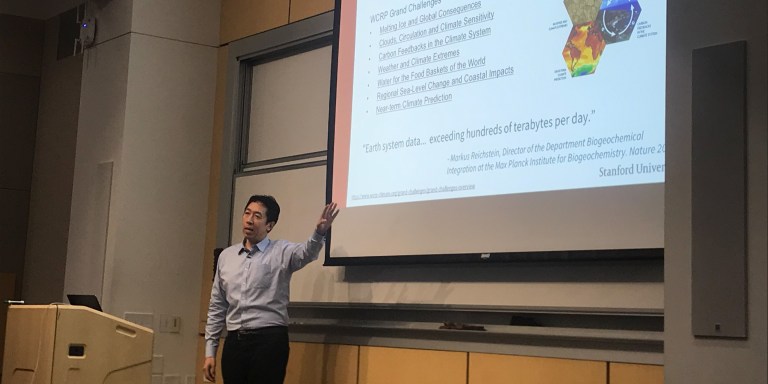After years of research spanning healthcare, education, autonomous vehicles and beyond, renowned computer science professor Andrew Ng has his sights set on climate change.
Two months after the birth of Ng’s daughter — who he said will age in a world shaped by the decisions of today — the professor is leading an AI for Climate Change (AICC) bootcamp to mitigate the impacts of “what may be the biggest problem facing humanity.” The bootcamp gives students an opportunity to work with Ng, Ph.D. students and other professors to develop AI-based solutions to specific climate issues.
“AI gives us a new set of superpowers,” Ng said in a symposium held Monday to highlight recent work at the intersections of AI and climate change.
Student projects presented in Bishop Auditorium included modeling wildfire likelihood, identifying arctic lakes with possible methane emissions and monitoring anaerobic wastewater treatment, among others.
Ng said that, while he is “privileged to have seen” the amount of work put by Silicon Valley into advertising, climate change mitigation would accelerate greatly “if we had one-tenth as much work on climate change as we have on getting people to click on ads.”
It is not a matter of which work is more meaningful, he added later, so much as it is a need to spread work across different projects. The number of people working with AI and climate change, he said, is considerably small relative to the amount of data available on environmental systems.
“Climate modeling is one of the most exciting ways to work on an important problem,” he said.
Ng expressed hope that more Stanford community members will seek to model the environment, research emissions mitigation, study adaptation of civilizations to reduce harm from climate change, develop more efficient restoration techniques and perhaps even employ geo-engineering to alter the climate directly.
“I don’t think any of us really know if it’s a good idea or not,” he said of geo-engineering.
In the end, he said, he hopes to inspire “the broader, global AI community” to work on solving problems related to climate change.
“Our job isn’t done when we publish a paper,” Ng said of his research group. “Our job is done only when we make a concrete impact.”
Symposium co-organizers Jeremy Irvin M.S. ’18 and second-year Ph.D. student Sharon Zhou, who work with Ng’s research group, said the event was intended to build excitement around AI and climate change leading into the AICC bootcamp, which is accepting applications until Wednesday and will begin on April 15.
The students, who both worked previously on medical imaging in Ng’s lab, shared perspective on shifting their focus to climate change. Having run a healthcare bootcamp in the past, they commented on adapting the bootcamp framework to another issue where they can make a tangible impact.
“We all realized that this is a problem that we’re all passionate about,” Irvin said.
After speaking to a variety of climate-minded professors, he added, he noticed that “each of them had their own set of ideas where you could apply AI to the space.”
“There has been work in this space, but we would like to add even more,” Zhou said. “There are an infinite number of problems. There are more problems than people in this space, so we would like to encourage more people to join the effort.”
Regarding the interdisciplinary nature of the AICC bootcamp, Irvin said he has noticed a more diverse group of people applying than with the previous bootcamp on healthcare. The bootcamps, he said, aims to foster collaboration between experts in climate change and people with AI experience.
“That’s exactly the gap we’re trying to bridge,” he said.
Zhou said the emphasis applicants have placed on making a difference has been “really exciting to see.” In regard to the politics surrounding climate change, Irvin said the bootcamp has not received any negative feedback thus far.
“We care a lot about a diversity of projects,” Zhou said, stressing the team-based nature of the students, who are expected to produce “cutting-edge” research.
Irvin said the main goal with AI is understanding the wealth of data out there. Zhou added that an important aspect of climate science is making predictions “more and more certain.” She pointed out that deep learning can reduce uncertainty in environmental analysis, making decisions easier for policymakers and other leaders.
Zhou said Ng “thinks from the lens of impact,” and Irvin described working in Ng’s lab as an effort in “doing the right thing.” Now, they aim to do the right thing to preserve the planet for people like Ng’s daughter and others worldwide.
Contact Holden Foreman at hs4man21 ‘at’ stanford.edu.
